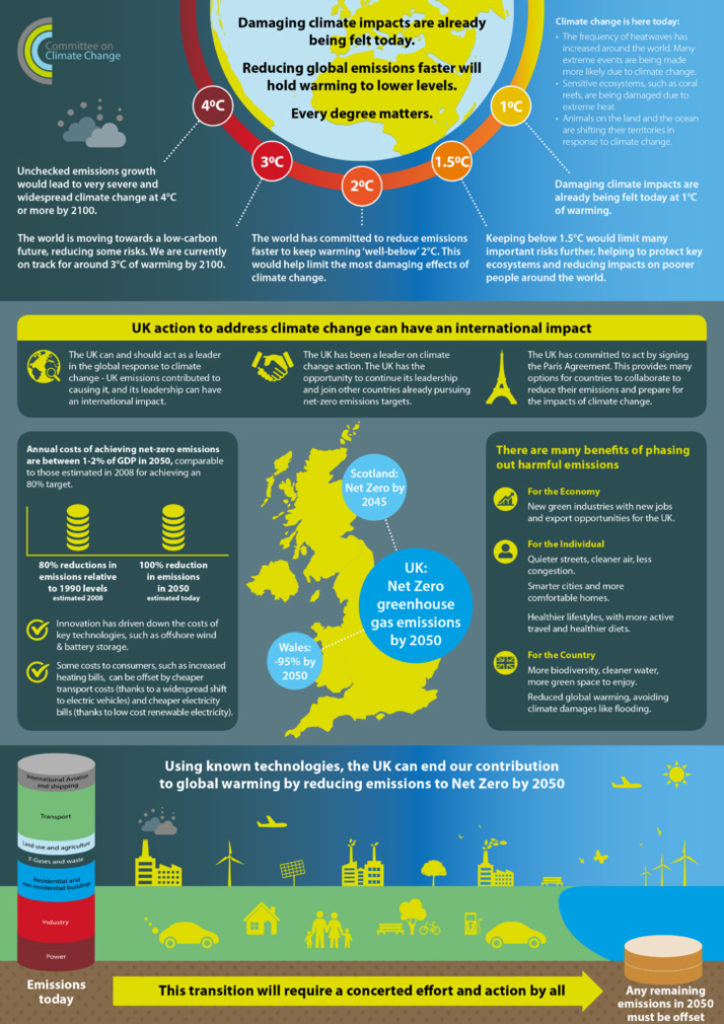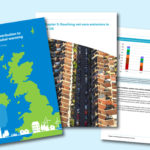In ‘Net Zero — the UK’s contribution to stopping climate change’, the Committee on Climate Change (CCC) calls for the UK to adopt a new, net zero* greenhouse gas emissions target by 2050, and large-scale low or zero carbon heating installation by 2030. Cibse reports.
The recommendations draw on a detailed analysis of an extensive body of current evidence, some of which is presented in the report for the first time. The committee has reviewed the latest scientific evidence on climate change, which includes the IPCC Special Report on Global Warming of 1.5˚C. They have also considered how the UK can play an appropriate role in addressing the global challenge to limit future temperature increases.
The report and the technical evidence published alongside it provides a fresh understanding of the potential for the UK to achieve deep emissions reductions, and reappraises the costs and benefits to the UK economy of doing so. Based on this analysis the CCC concludes that setting a net-zero target is necessary, feasible and cost-effective.
Responding to the now overwhelming evidence of the role of greenhouse gases in driving global climate change and meeting the UK’s commitments as a signatory of the 2015 Paris Agreement require us to adopt a net zero target. The technologies and approaches that will deliver net-zero are now understood and available to be implemented, albeit ‘with strong leadership from government’ as a requirement.
And these approaches are now cost-effective because the current cost of key technologies enables a net-zero target to be met within the very same cost limits that were accepted as by Parliament when it passed the Climate Change Act in 2008 with the present 80% reduction target by 2050.
In the buildings sector the committee recognises that the foundations for a net zero target are in place, but calls for a ‘major ramp-up of policy effort’ to deliver energy-efficient buildings and low carbon heating across the sector and the stock. They are quite explicit about the need for greater urgency to deliver progress, describing current plans as “insufficiently ambitious” or “proceeding too slowly, even for the current 80% target”.

They comment that more than 10 years after the Act was passed, “there is still no serious plan for decarbonising UK heating systems and no large-scale trials have begun for either heat pumps or hydrogen”. They call for the 2020 heat road map to set out the strategy to 2030 and beyond. This really is a wake up call for the building services sector: we need to take a serious look at how we can deliver effective low or zero carbon heating at scale, which is essential to meeting a zero carbon target rather than the current 80% reductions.
The committee also consider that 2040 is too late for the phase-out of petrol and diesel cars and vans and that the current plans for delivering this are too vague, which means that we also have to consider how we are going to respond to the need to deliver the infrastructure to support electric vehicles within the built environment.
Recognising that meeting these targets will require additional investment in buildings, the committee underlines the need for a stable investment environment and emphasises “the importance of ensuring that policies are designed with investors in mind”, to reduce exposure to unnecessary risks. The long-term contracts offered through the Electricity Market Reform mechanism are cited as a good example of an effective policy vital to reducing costs for renewable power.
They also recognise the cost premium of low carbon heating in homes, which remains a major challenge. It is currently taxpayer funded through government programmes, but roll-out is limited and less than £100m was spent in 2018, whilst the committee calls for large-scale deployment by 2030. The CCC estimates annual costs for switching to low-carbon heating of the order of £15bn, and considers it will be regressive and slow progress if these costs are passed on fully to households. They therefore call for the Treasury to review the funding, and note that the costs of low carbon heating are similar to the potential combined saving from falling power costs and electric vehicles.
The CCC identify multiple benefits of switching to a zero carbon economy, including health benefits from better air quality, less noise due to quieter vehicles, more active travel through more cycling and walking, healthier diets, and recreational benefits from changing land use. There would be a boost to the economy in terms of growing exports, productivity and jobs as the UK takes a lead in low-carbon products and services.
Lord Deben, Chairman of the Committee on Climate Change, said: “We can all see that the climate is changing and it needs a serious response. The great news is that it is not only possible for the UK to play its full part — we explain how in our new report — but it can be done within the cost envelope that Parliament has already accepted. The Government should accept the recommendations and set about making the changes needed to deliver them without delay.”
Hywel Davies, CIBSE Technical Director said: “This really is a wake up call for the building services sector: we need to take a serious look at how we can deliver effective low or zero carbon heating at scale, which is essential to meeting a zero carbon target rather than the current 80% reductions.”
* A net-zero target would require a 100% reduction in greenhouse gas emissions. It is referred to as ‘net’ as the expectation is that it would be met with some remaining sources of emissions which would need to be offset by removals of CO2 from the atmosphere — by growing trees, for example.









